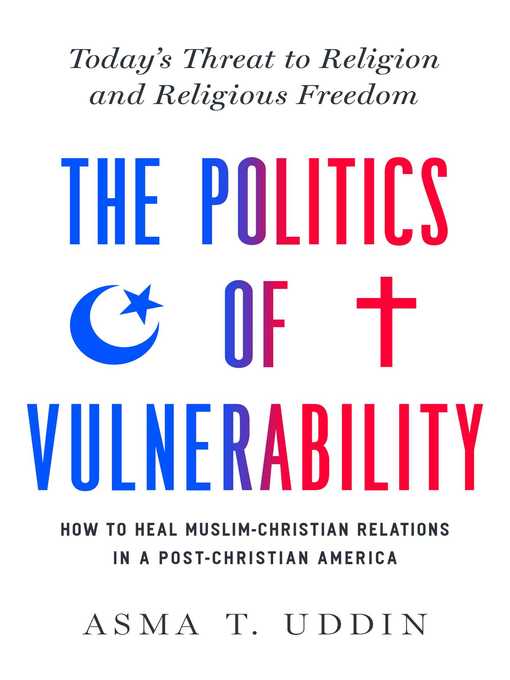
The Politics of Vulnerability
How to Heal Muslim-Christian Relations in a Post-Christian America: Today's Threat to Religion and Religious Freedom
کتاب های مرتبط
- اطلاعات
- نقد و بررسی
- دیدگاه کاربران
نقد و بررسی

January 15, 2021
A religious liberty lawyer delves into the thorny political, social, and cultural issues that divide Christians and Muslims in America. In this follow-up to When Islam Is Not a Religion, Uddin once again draws on her years of experience with interfaith dialogue. In the first of four sections, the author asks, why do many--though certainly not all--White evangelical Christians fear and/or resent Muslims? As she demonstrates in the second part, the answer hangs on "monumental demographic and cultural shifts," especially a long-term secularizing and "browning" of America. Feeling left behind by these trends, many conservative Christians react with "a fusion of faith and patriotism" that sociologists Andrew L. Whitehead and Samuel L. Perry dub "Christian nationalism." Along with divisive political bluster and conspiracy theories, Christian nationalism arouses feelings of in-group solidarity and out-group hostility. These feelings frequently target Muslims as the out group, a fact that Uddin interprets using a concept from political scientist Lilliana Mason: "mega-identities," meaning that "a single vote can now indicate a person's partisan preference as well as his or her religion, race, ethnicity, gender, neighborhood, and favorite grocery store." In this view, defending Islam--and, by contrast, ignoring or even disparaging Christianity--signals a liberal mega-identity and is therefore to be resisted by conservatives. Uddin's primary solution involves challenging such mega-identities and welcoming partisan realignment despite the risk of "the black sheep effect." It's important to note that the author's message is not just for conservatives or evangelical Christians: "The same intergroup dynamics [that explain why conservative Christians feel threatened] likely also apply to the Left's hostility toward the Right." Uddin is coolheaded and sympathetic throughout, refusing to take sides and insisting that listening to the grievances of conservative Christians could be helpful in preventing anti-Muslim anger. A potent challenge to prevailing thoughts on politics and culture, with the goal of bringing Muslims and Christians closer.
COPYRIGHT(2021) Kirkus Reviews, ALL RIGHTS RESERVED.

March 5, 2021
Uddin (When Islam Is Not a Religion) takes a sociological view of U.S. society in an effort to better understand public rhetoric, especially relating to how people respond to changing demographics among the country's Christian and Muslim populations. The book is divided into four parts. The first profiles those who feel most threatened by Muslims and their influence on society. Next, Uddin explains how majority groups feel threatened when they become a minority--and how they sometimes respond by calling for conformity. The third part explores the psychology of out-group members, who often feel victimized and engage in similar demagoguery. The author highlights how group differences can eventually lead to an "us" vs. "them" mentality. As a result, polarization intensifies until there is little common ground among the country's different sub-populations. The last part of the book explores ways for people to find common ground. These pathways are more like general directions that people can take to promote greater understanding and harmony. VERDICT From a sociological perspective, Uddin's analysis is spot-on. However, there are other facets to this discussion, including the problem of asking people who are marginalized to reach out, which means these recommendations are primarily useful/actionable/practicable for people with privilege.--Muhammed Hassanali, Shaker Heights, OH
Copyright 2021 Library Journal, LLC Used with permission.

























دیدگاه کاربران